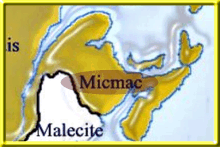
The Mi'kmaq, also known as the Mikmaq, are Indigenous peoples who have lived in what is now the Maritime Provinces of Canada and the northeastern United States for thousands of years. Their traditional territory includes present-day Nova Scotia, New Brunswick, Prince Edward Island, and parts of Quebec and Maine.
The Mi'kmaq have a rich cultural heritage that includes unique languages, spiritual beliefs, and social practices. They have a strong tradition of storytelling, music, and dance, and their artwork is known for its intricate and beautiful designs.
The arrival of European settlers in the 16th century had a profound impact on the Mi'kmaq. They faced significant challenges, including disease, land loss, and cultural displacement. Despite this, the Mi'kmaq maintained their traditions and continue to play an important role in the cultural fabric of their communities.
Throughout the 20th century, the Mi'kmaq made significant efforts to reclaim their heritage and assert their rights. This included the formation of the Assembly of Nova Scotia Mi'kmaq Chiefs in the 1970s, which helped to provide a united voice for the Mi'kmaq people.
Today, the Mi'kmaq continue to work towards self-determination and the preservation of their language, culture, and traditions. They are an integral part of the larger Indigenous community in Canada, and their contributions to the country's cultural and political landscape are widely recognized and valued.
Here are some significant events and dates in the history of the Mi'kmaq people:
Pre-contact: The Mi'kmaq people have lived in the Maritime Provinces of Canada and the northeastern United States for thousands of years. They developed a rich and complex culture that was well-adapted to their environment.
1534: French explorer Jacques Cartier arrives in the Gulf of St. Lawrence, marking the beginning of European contact with the Mi'kmaq people.
1610: Samuel de Champlain establishes a settlement in present-day Nova Scotia, bringing with him French settlers and sparking a period of colonization and displacement for the Mi'kmaq.
1621: The Mi'kmaq sign the first of several treaties with the French, establishing a relationship of friendship and trade.
1755-1763: The Seven Years' War between France and Britain has a devastating impact on the Mi'kmaq, who are caught in the middle of the conflict. The Treaty of Paris in 1763 cedes control of the Maritime Provinces to the British.
1779: The Mi'kmaq take part in the Battle of Restigouche, fighting against the British in what would be their last armed resistance in the region.
1876: The Indian Act is passed, imposing a system of government control over Indigenous peoples in Canada and limiting their freedoms and rights.
1949: The Indian Act is amended to allow for the removal of Indigenous children from their families and communities and placement in residential schools, a traumatic period in Canadian and Mi'kmaq history.
1970s: The Assembly of Nova Scotia Mi'kmaq Chiefs is formed, providing a united voice for the Mi'kmaq people and helping to advance their rights and interests.
1999: The Supreme Court of Canada recognizes the existence of the Treaty of 1752, a historic agreement between the Mi'kmaq and the British Crown, setting a legal precedent for the protection of Indigenous rights.
Today: The Mi'kmaq continue to work towards self-determination and the preservation of their language, culture, and traditions, and play an important role in the larger Indigenous community in Canada.
